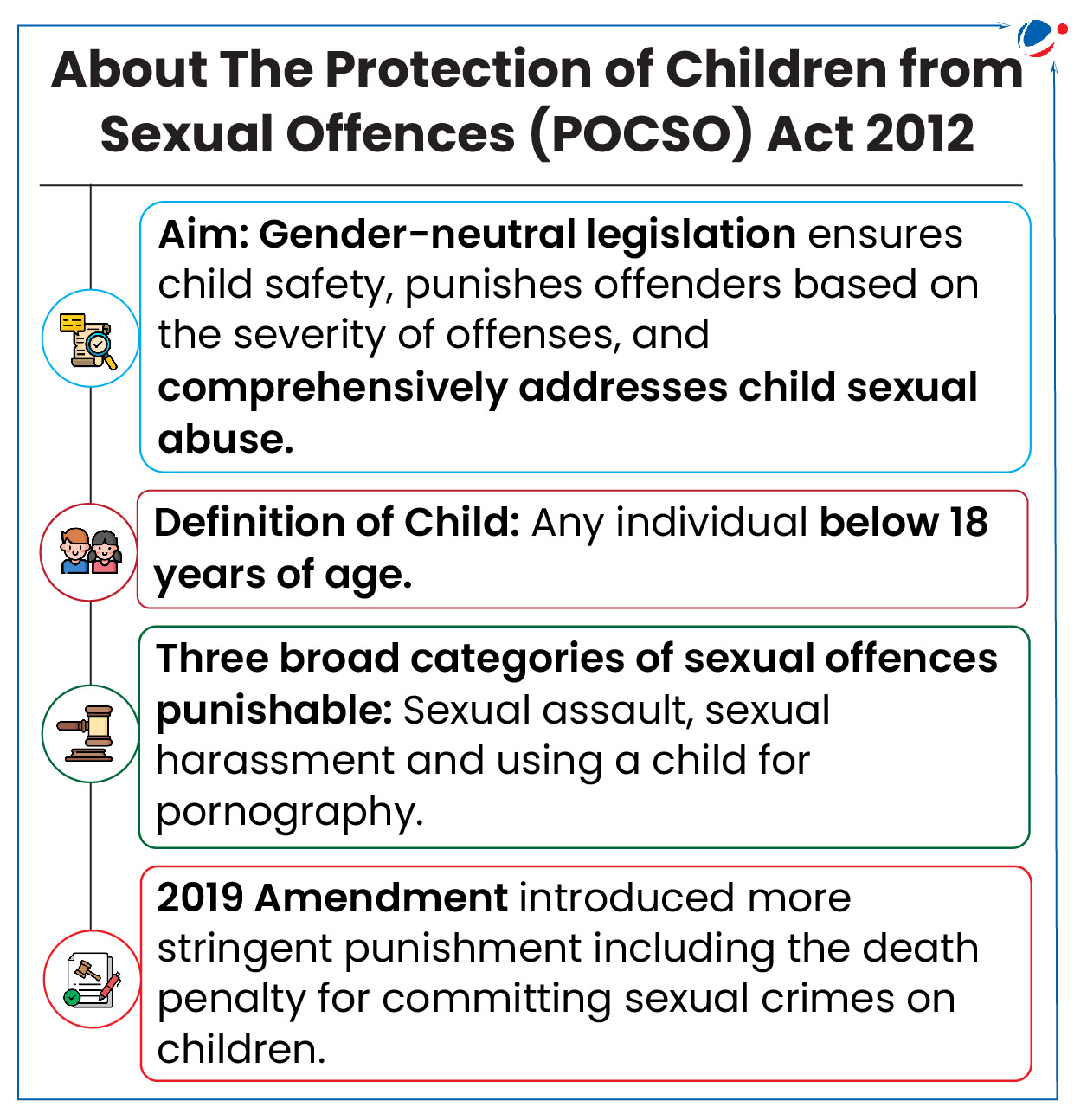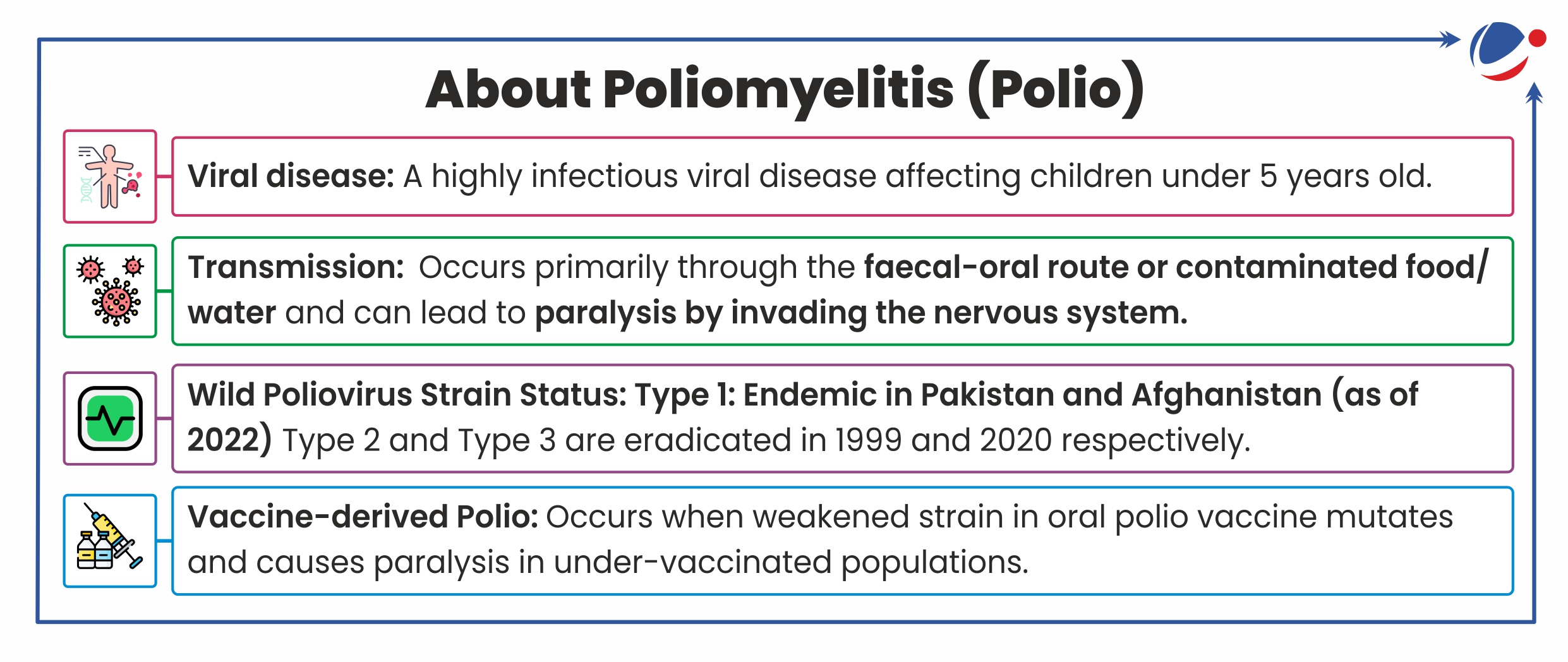Protection of Children from Sexual Offences (POCSO) Act, 2012

Supreme Court (SC) held that Sexual assault under POCSO cannot be quashed on the basis of the compromise between parties.
- The judgement was delivered in n Ramji Lal Bairwa & Anr vs State of Rajasthan & Ors Case.
- SC held this while reviewing Rajasthan High Court’s decision of quashing a ‘sexual assault’ case under the Act.
- Case has been heard under Special Leave Petition.
- Article 136 of the Constitution vests the SC with a special power to grant special leave to appeal against any judgment/order/decree in any matter or cause passed or made by any Court/tribunal.
Key Observations
- Rejection of Compromise Precedent: Court made reference of the State of M.P. v. Laxmi Narayan (2019) case which held that an offense against the society cannot be compromised.
- Also, endorsed the Delhi High Court judgment (Sunil Raikwar v. State) which held that a POCSO offense cannot be settled.
- Non Private nature of offense: Court observed that such crimes cannot be treated as private matters eligible for compromise-based quashing.
- Also, held that cases which have serious societal implications should not be dismissed solely based on a settlement.
- Tags :
- Article 136
- POCSO Act, 2012
- Special Leave Petition
- State of M.P. v. Laxmi Narayan (2019) case
10 Years of Polio Eradication in India
In 2014, the World Health Organization declared India polio-free based on criteria including three years of no wild poliovirus transmission, robust surveillance systems, and the destruction of any remaining stocks of the virus.
- It involved culmination of decades of dedicated efforts, starting with India’s participation in the Global Polio Eradication Initiative and national immunization efforts under Universal Immunization Programme (UIP).
About Universal Immunization Programme
- It is one of the world’s largest public health programs providing free vaccines for 12 vaccine-preventable diseases.
- In 1985, Expanded Programme on Immunization was renamed as UIP, broadening its reach to rural areas beyond urban centers.

Preventive measures to maintain Polio-free status in India
- Annual Polio Campaigns: National Immunization Days (NID) and Sub-National Immunization Days (SNID) conducted annually to keep immunity levels high and ensure that no child is missed.
- Surveillance and Border Vaccination: Vaccination at international borders continues to mitigate the risk of polio re-importation from endemic regions.
- Inactivated Polio Vaccine (IPV): Introduced in 2015, provides additional protection against polio, especially against type 2 poliovirus.
- Mission Indradhanush: Launched in 2014, it aims to increase immunization coverage to 90%. Special attention is given to hard-to-reach areas with low immunization rates.
- Tags :
- Universal Immunization Programme (UIP)
- Global Polio Eradication Initiative
- Polio Eradication in India
Articles Sources
Children Lacking Minimum Dietary Diversity

A study revealed that 77% children in India aged 6-23 months lacking minimum dietary diversity.
About Minimum dietary diversity (MDD)
- According to WHO, Minimum dietary diversity (MDD) is present when a diet contains five or more of following 8 food groups i.e. breast milk; grains; legumes; dairy products; flesh foods ; eggs; fruits & Vegetables.
- Food intake from less than five food groups is considered minimum dietary diversity failure (MDDF).
Key finding of Study Related to MDD in India (For Year 2019-21)
- Regional Disparities: Central region of India, particularly Uttar Pradesh, Rajasthan, Gujarat, Maharashtra, and Madhya Pradesh, has over 80% of children with MDDF.
- Age Impact on MDDF: children in younger age group, i.e. 6–11 months (87%) have highest prevalence of MDDF relative to higher age groups.
- Vulnerable Sections: Children from Other Backward Classes (OBC) have highest MDDF (79%), followed by Scheduled Castes (77%) and Scheduled Tribes (76%).
- Other findings: Children of illiterate, young and rural-residing mothers with no exposure to mass media were more likely to be diet deficient.
Issues in ensuring dietary diversity
- Nutritional Composition: Fruits, vegetables & animal products are consumed minimally.
- Lack of Education: illiterate mothers have an MDDF of 81%, versus 75% for educated mothers.
Recommendations
- Targeted Outreach (Prioritize efforts aimed at pregnant women, especially those with high-risk pregnancies),
- Engaging communities using local governance for nutrition activities.
- Tags :
- POSHAN Abhiyaan
- Minimum Dietary Diversity
- MDDF
UNESCO Released ‘Global Education Monitoring Report 2024’
Report was released at the Global Education Meeting, organized by United Nations Educational, Scientific and Cultural Organization (UNESCO) and hosted at Fortaleza by the Government of Brazil (Current G20 President).
Key Observations of the Report
- Leaders as agents of change: In education, leadership is a process of social influence aimed at maximizing joint efforts towards a common goal. Function of an education leader:
- Define their purpose and plan how they will influence change.
- Balance targeted learning outcomes with equity, quality, and inclusive education goals.

- Lack of funding: 4 in 10 countries spend less than 4% of GDP on education.
- Out of School children: 251 million children and youth globally and there has been a reduction of just 1% since 2015.
- Access to education: Central and Southern Asia has continued making rapid progress in access to education.
- However, Afghanistan, Bangladesh, India and Pakistan have the largest out-of-school populations in the world
Key Recommendations
- Leadership development: Principals should be given the freedom to manage their schools effectively.
- System leader: Develop education officials’ capacity to serve as system leaders
- Climate change education needs to be taught more in the earlier grades and across more subjects than just science.
- Tags :
- UNESCO
- Global Education Monitoring Report 2024



